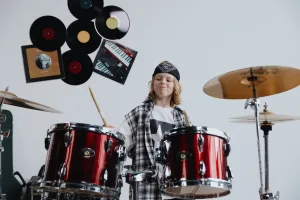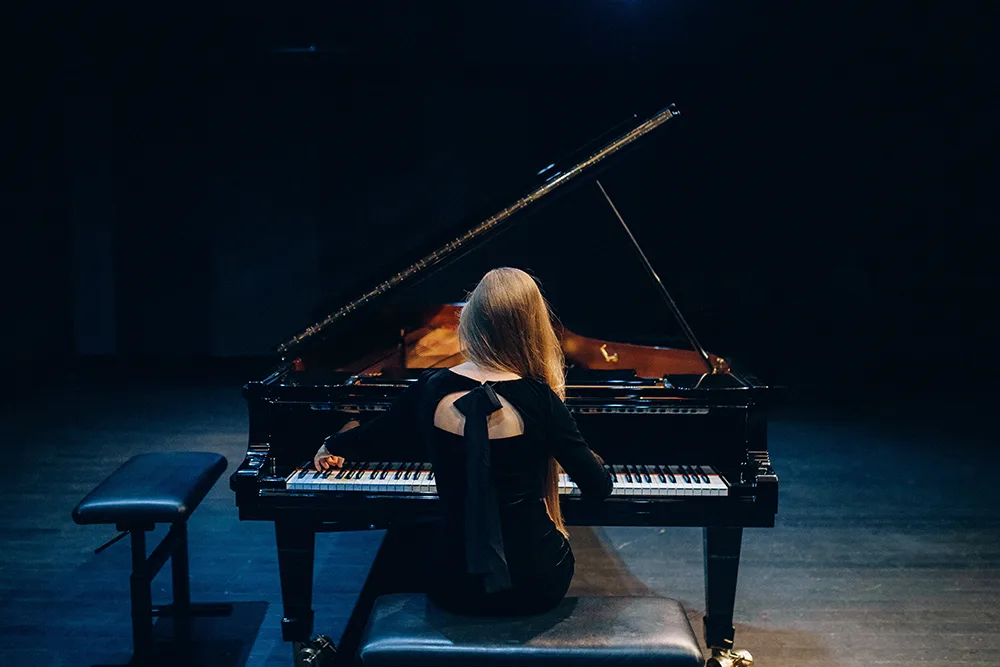Music can change us on an emotional, mental, and bodily level. Many of us value music’s capacity to stir up emotions. But music’s advantages go well beyond just stirring up our emotions. Playing music can improve cognitive capacities, one of its most important benefits. More specifically, it has been demonstrated that playing an instrument improves memory, creativity, coordination, confidence, and communication abilities. This article will explore five unexpected ways that learning an instrument improves brain function and demonstrate practical applications for these abilities in your musical, personal, and professional lives.
 Way #1: Improving Memory
Way #1: Improving Memory
Playing an instrument is a fantastic approach to passing the time and sharpening your mind. Improving memory is one of the most amazing advantages of playing an instrument.
For example, the hippocampus, a crucial brain area for creating and storing memories, has been found to benefit from music training in studies. It has been demonstrated that musicians have greater spatial memory and a wider memory pool than non-musicians.
According to University of Helsinki research of older persons who had either participated in sports or music throughout their adolescence, those who had performed music had higher mental flexibility and had special memories. The study’s authors concluded that picking up a musical instrument could delay or even reverse the effects of aging on cognitive function.
Musical practice can help improve memory in several ways:
- Learning to read music requires memory of notes and their position in the music.
- Playing an instrument requires using both brain hemispheres, stimulating brain function, and developing memory.
- Rehearsing music strengthens the brain’s neural pathways, promoting better cognitive function.
If you want to improve your memory through musical practice, here are some tips for you:
- Practice regularly: Regular practice builds up a strong neural network in your brain, which enhances your memory.
- Focus on learning new pieces: When you learn a new piece, you must memorize the notes, finger positions, and timing. It requires regular practice and will help boost your memory power.
- Practice without looking at music sheet: As you grow more confident with playing an instrument, try playing without looking at music sheet. This activity will engage your brain and help improve your memory.
- Use mnemonics: Mnemonics are memory-enhancing tricks that can help you remember challenging pieces of music. For instance, try associating specific notes with memorable phrases or images.
 Way #2: Boosting Creativity
Way #2: Boosting Creativity
Playing an instrument encourages cognitive growth and creativity, improving one’s quality of life. According to studies, creativity and musical instruction are closely related. Playing an instrument can encourage creativity in various spheres of life and offer new ways of thinking.
Playing an instrument encourages a close connection between the individual and their inner voice to generate new ideas, which fosters creativity. Additionally, it supports the brain’s ability to innovate and improvise, two crucial skills for the growth of creative thinking.
There are various ways to take advantage of music’s creative benefits, including:
- Playing with different musical genres: Experimenting with different musical genres on your instrument may encourage you to gain new skills and develop your creativity. Trying out a new instrument could increase the variety and inspire new songs.
- Improvisation: Improvisation is the act of creating music at the moment and is a great technique to boost creativity. Pick up a musical instrument and begin to play your favorite song while allowing your imagination to expand on it and produce an original, fresh rendition.
- Collaboration: Working with musicians who play various instruments or have diverse perspectives can inspire innovation. Combining many ideas to produce something new can be fascinating.
- Writing your music: Writing your music can inspire creativity and be just as satisfying as playing an instrument. Combining your thoughts and feelings with music can make something unique and individual.
Beyond only playing an instrument, music can foster creativity in various facets of life. For instance, listening to music while doing anything creative, like painting or writing, can help people be more productive and spark their imagination. Music can also be used in other creative activities to boost creativity and make them more fun, such as dancing, gardening, and other creative activities.
 Way #3: Enhancing Coordination
Way #3: Enhancing Coordination
Playing an instrument requires high hand-eye coordination, which can also translate into other areas of life, such as sports, dance, and even typing. Playing an instrument can improve overall motor skills, enhancing coordination and increasing overall physical agility.
It also requires coordination between the two sides of the brain and hand-eye movements. This skill sharpens hand-eye coordination and the ability to perform intricate movements accurately, which can help improve overall coordination.
A study by the University of Montreal investigated the effect of piano instruction on preschool children’s motor skills. Results showed improvements in motor skills and hand dexterity among children who received musical training. The study revealed that learning to play an instrument, specifically the piano, can develop fine motor control, finger dexterity, hand-eye coordination, and essential life skills.
There are several musical activities and exercises that individuals can perform to improve their coordination skills, some of which include:
- Exercises to improve finger dexterity: Finger isolation exercises, such as playing scales, arpeggios, or finger exercises, help improve finger coordination and agility.
- Clapping exercises: Clapping to different beats is an excellent exercise to improve hand and foot coordination.
- Drumming: Learning to play the drums helps develop coordination between feet and hands, improving overall coordination.
- Playing music with different time signatures: Playing music pieces with different time signatures helps develop coordination by challenging the brain to think in new ways.
 Way #4: Building Confidence
Way #4: Building Confidence
The confidence levels of a person can be increased by playing an instrument. To acquire the ability to learn an instrument, one must put up the necessary time, energy, and persistence. By overcoming these obstacles, one can gain more self-confidence.
Studies indicate that participating in musical activities can result in increased dopamine generation. Dopamine is a neurotransmitter that is linked with positive emotions and happiness. Therefore, individuals who participate in musical activities may experience higher levels of confidence and contentment.
Here are some instances of how music can be utilized to boost your confidence or the confidence of others:
- Regularly performing music in public settings, such as busking, open-mic nights, or participating in local competitions, can help individuals overcome their anxiety about performing in front of others and eventually acquire confidence.
- Composing music can be a freeing experience and a unique self-expression method.
- Collaborating with other musicians can improve one’s skills and open up new ideas and skills.
- Music therapy provides a supportive setting to improve personal connection, mental wellness, and self-esteem.
There are countless personal stories and tales about music’s transformative power. From youngsters learning a new instrument for the first time to playing in front of an audience for the first time to individuals finding solitude and comfort during a music concert, music has affected everyone. There are several examples of how music may boost your confidence in yourself and your abilities.
Did you know? One of them is Adele.
Despite her aversion to singing in front of people, Adele’s well-known path from performing in small London bars to sold-out venues worldwide proves music’s transformational power. She gained confidence through consistent practice and performances and rose to superstar status, inspiring many.
Way #5: Improving Communication
Playing an instrument can greatly enhance verbal and nonverbal communication skills essential to creating and maintaining strong relationships. Learning musical instruments requires listening, communicating, and coordinating with other musicians, which allows the development of communication skills that are transferable to everyday situations.
Musicians must practice good listening skills, maintain eye contact, and read nonverbal cues, which is also essential in human communication. This skill helps individuals to be more empathetic, attentive, and responsive listeners in everyday conversations.
Musicians constantly communicate verbally and nonverbally on-stage performances through their music. They often use eye contact, body language, and facial expressions to create an unspoken connection with each other and the audience.
Here are some tips for incorporating musical techniques into everyday communication:
- Practice being present and actively listening during conversations to understand the other person’s message better.
- Nonverbal cues such as facial expressions, tone, and body language can enhance the delivery of a message and help individuals communicate their thoughts and emotions more effectively.
- Breathing techniques are essential in music and can be applied to everyday conversations. Controlled breathing can help during anxiety and stress and improve voice quality during presentations.
Playing a musical instrument provides numerous benefits beyond the enjoyment of playing and listening to music. The range of advantages is astounding, from improved memory and creativity to better coordination, confidence, and communication skills. The skills developed through playing an instrument also translate into daily life, positively impacting various parts of our lives, such as personal and professional relationships, sports, and creative pursuits. With these numerous benefits, it is no surprise that playing a musical instrument can have such a transformative effect on individuals.


